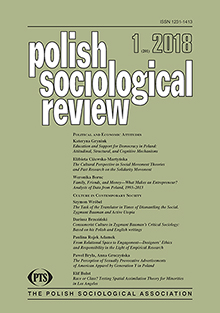Education and Support for Democracy in Poland: Attitudinal, Structural, and Cognitive Mechanisms
Education and Support for Democracy in Poland: Attitudinal, Structural, and Cognitive Mechanisms
Author(s): Kateryna GryniukSubject(s): Sociology
Published by: Polskie Towarzystwo Socjologiczne
Keywords: democratic values; education; authoritarianism; social class; cognitive abilities
Summary/Abstract: Abstract: While it is well-known that education is positively connected to support democracy (competitive elections, a multi-party system, and the belief that political leaders must obey the law) in the countries of Central and Eastern Europe, we have few empirical tests of how attitudinal, structural, and cognitive mechanisms mediate that connection. I use the Polish Panel Survey (POLPAN) for 2008–2013, a crucial period that captures the Polish political experience after acceding to the European Union and before the massive political change of the 2015 elections, to empirically test how these different mechanisms impact the link between education and democratic values. I find empirical support for the hypotheses that (a) in terms of attitudes, higher levels of education are associated with lower authoritarian attitudes, which in turn correlate with stronger pro-democratic values; (b) in terms of structure, individuals with higher levels of education, who are more likely to belong to privileged social classes, are more pro-democratic; (c) in terms of cognitive mechanisms, higher educational attainment is associated with higher cognitive abilities, which in turn correlate with stronger support for democracy.
Journal: Polish Sociological Review
- Issue Year: 201/2018
- Issue No: 1
- Page Range: 3-26
- Page Count: 24
- Language: English

